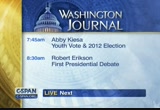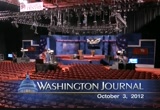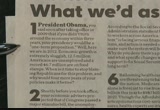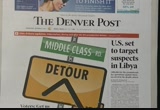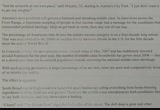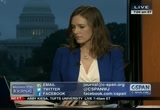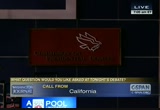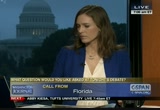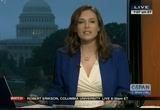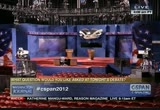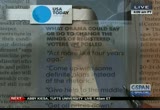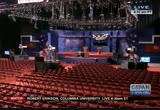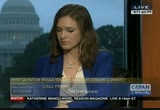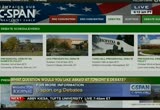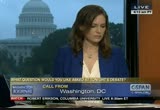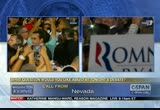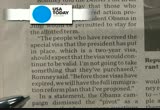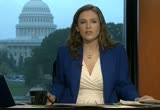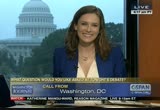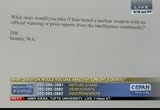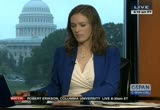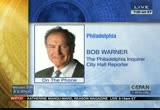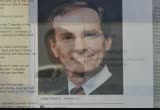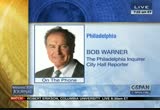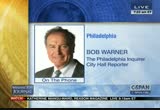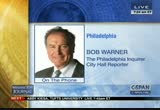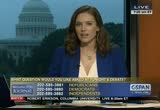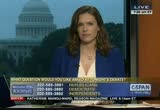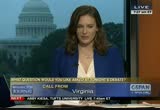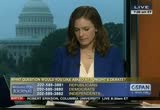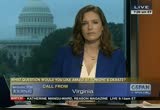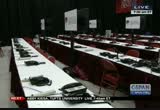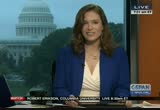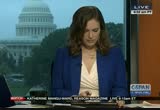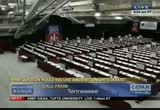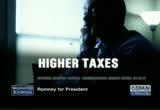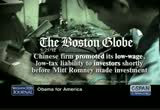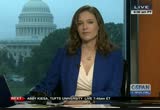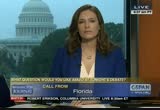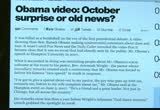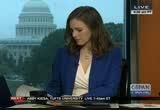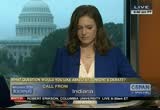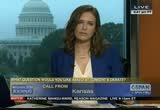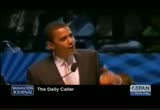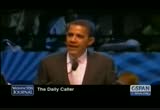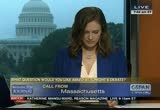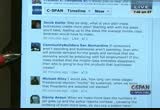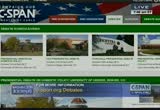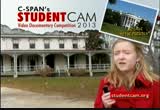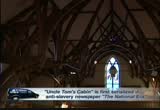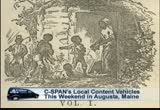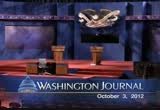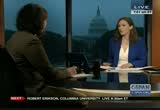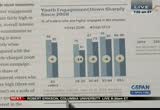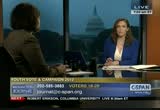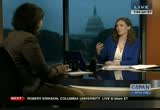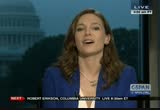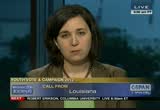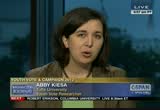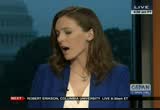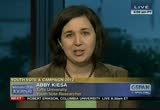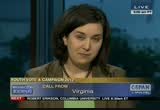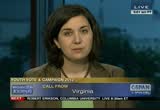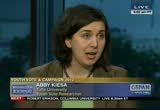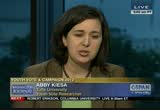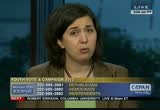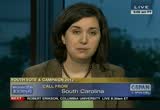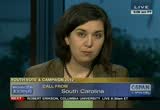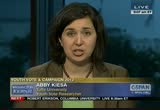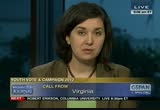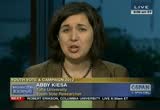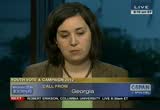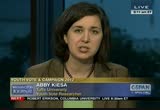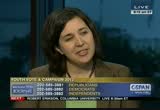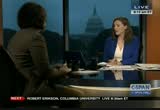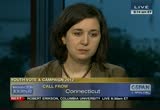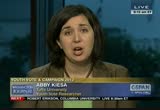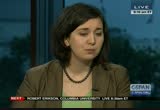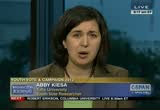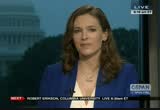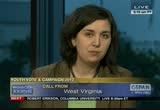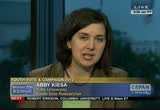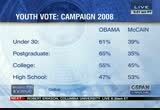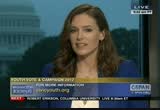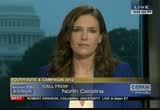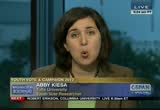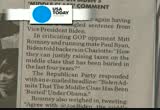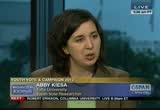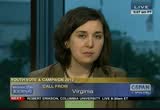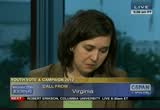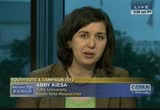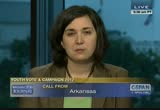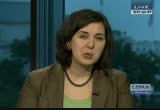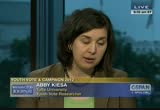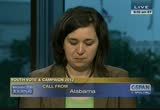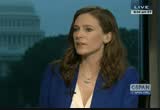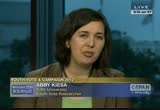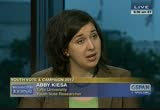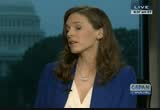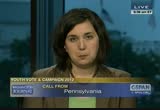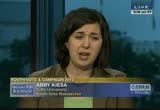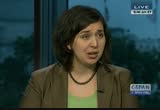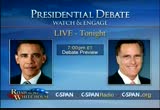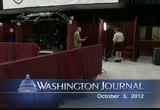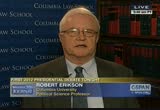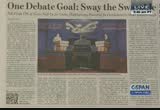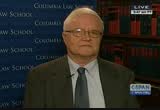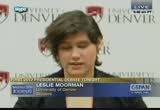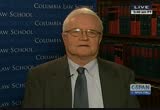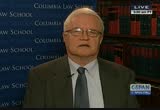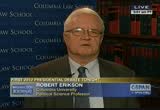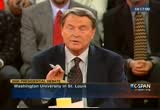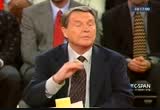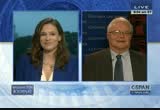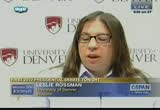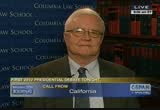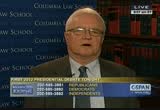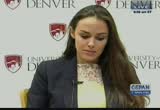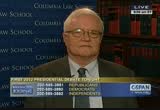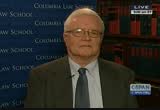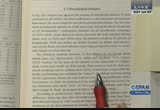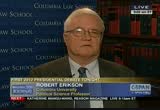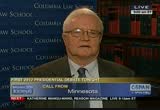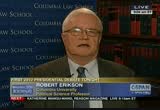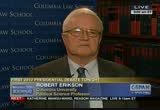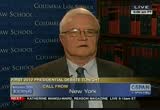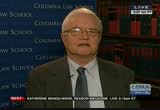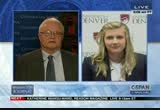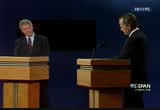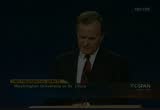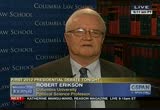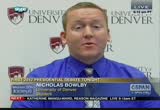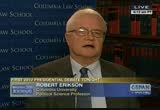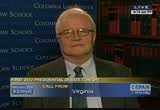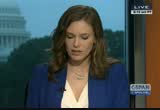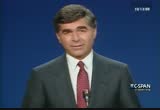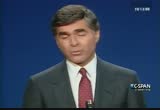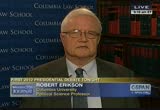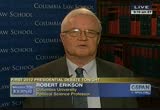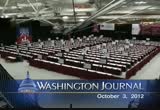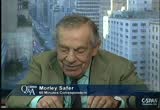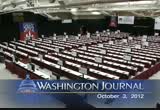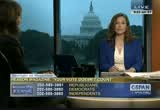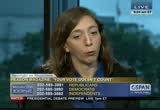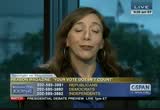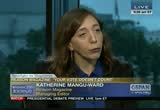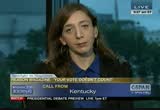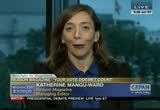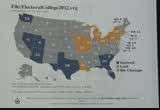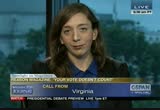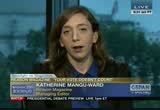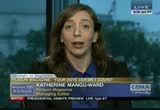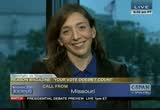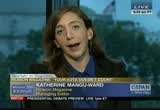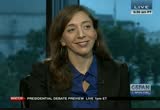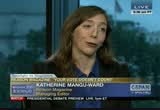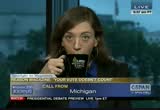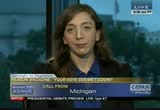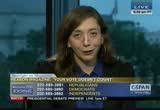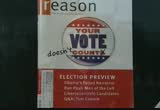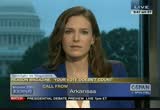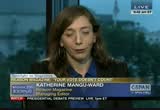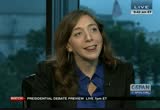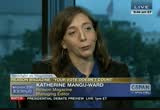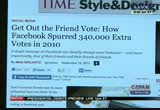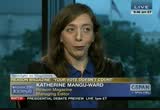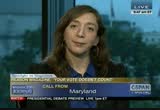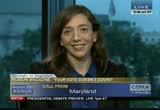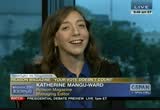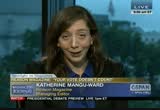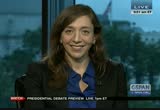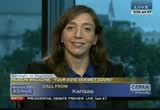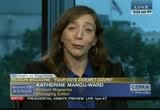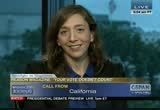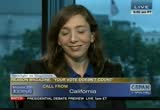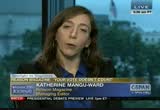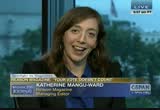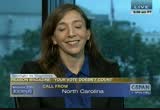tv Washington Journal CSPAN October 3, 2012 7:00am-10:00am EDT
7:00 am
will be our guest. at 8:30, we will hear from robert erikson, a columbia professor. and at 9:15, our guest will examine the reasons why people vote. ♪ host: good morning, welcome to "washington journal," this wednesday, october 3, 2012. we are looking at a live shot of the site of tonight's debate between former governor romney and president obama. this debate is one of three, this one will be focused on domestic issues. c-span will bring you live coverage tonight. the debate gets underway at 9:00. jim lehrer is the moderator and
7:01 am
is doing his final preparations. we would like to hear from you this morning. what questions do you have for the candidates? here are the numbers to call -- host: you can also find us online. send us a twitter message, twitter.com/c-spanwj. we have a special hash tag for this, c-span 2012. or you can e-mail us at journal@c-span.org. the opinion section of "usa today," tackling this morning's question. the number one question for president obama? it revolves around the economy. they would like to ask president obama -- "if you did not turn
7:02 am
7:03 am
debate. the top story this morning on the front page that we are looking at right now, "middle- class detour." the story looks at local voters, saying that the next american president will be governing a shrinking middle class. people in that income range had a message for the president that transcended political ideology. the percentage of americans that fit into the middle income category was exacerbated in the 2000's as median family income shrunk. in colorado, where it started to raise in 2007, its stubbornly hung around 8% for the last year.
7:04 am
it is the slower rate compared to household population overall. other articles look at the impact of the latino vote in colorado. let's hear what you have to say. bob is in new york city on the democratic line. caller: i have two questions for the candidates. why, in this day and age, are women's reproductive rights even being called up? are they aware that in this century, at this late date -- why are we going back and rehashing this? an issue that has been dealt with and should not even be on the table? also, i would want to know possibly, and i will vote for the president, and from him i
7:05 am
would want to know why -- i thought that his calling when he came to office was to get on top of wall street, get on top of that problem with the big banks, with all the crazy financing that even some of the experts cannot understand. again, i will vote for him, maybe he will do this in the next term, deal with the big banks and the issues surrounding why they have not been regulated or clamped down on in a meaningful way so that we can go forward. if we are going to talk about certainty, we need to know that the banks will not be falling back into the abyss that they got us into before. host: richard, republican line, hello.
7:06 am
caller: i would ask both candidates where they think inflation is going to rear its head in their administration. you have a lot of people here making money on gold. [no audio] including myself, homeowners in california, looking at a 10 year historic curve. with inflation possibly being affected, things could still double dip into worst times. i would like to see where inflation sits with them. host: daytona beach, florida. good morning. caller: good morning. thank you for c-span. i was wondering why the republicans, why -- how come they give their oath to governor norquist instead of the american
7:07 am
people? i cannot get over that. i really believe that they should give their allegiance to the american people who are paying their salaries. host: all right, let's go to monica, florida, homestead. hello. caller: how would mitt romney deal with welfare reform? what would be his ideas into reforming it? i would also like to ask president obama why he did not passed the delta bill or have it prepared with health care when he had control of the house and senate in 2008, 2009. host: we are getting some twitter messages. here is another question, coming to us.
7:08 am
host: something that we heard in the republican debates a couple of months ago. let's go to our next caller. what question would you like asked them up the morning. caller: good morning. my question would be to the president. if his policies are going to be the same as he promised, why should we vote for him, as we are not going to be better off if he is keeping the same promises as mentioned in 2009, when he became president. so, i am not voting for obama. host: any questions for governor romney? caller: no, i like the way that he speaks. i think we need a change in this administration. we have had four years of terrible policy and i do not think the president's is telling
7:09 am
7:10 am
do, according to this poll? host: lal, tracy landing, michigan. democratic line. good morning. caller: laurel? host: go right ahead. welcome to the show. caller, thank you. my question to obama -- why have you not allowed anyone to say one word about your college and high-school record? there is something there that is hidden and it makes me never willing to vote for you. it is scandalous. america, vote your conscience
7:11 am
so the weekend of hold american values. host: this message from twitter -- host: the next is lowest, memphis, tennessee. caller: everyone is asking obama questions, but i want to ask mitt romney about this situation in 1853, when the mormons killed the christians. i want to ask mitt romney about that. you do not hear anything about obama misusing anyone. mormons are talking about the president obama religion? i want to talk about the mormons
7:12 am
with mitt romney. i think obama is doing a good job for the problems that he inherited. how can anyone undo eight years of problems in four years? he is doing everything he can. thank you. host: c-span will be covering the debate live. we have a special campaign 2012 debate hub set up on the website. covering live coverage of all four debates. and other ways to socially engaged for you, the audience, to help bring together that love -- people that love politics and are interested in the debate, you can watch their and catch the debate live tonight and catch clips right afterwards, individual questions and answers provided by the question -- by
7:13 am
the candidates, organized by topic. that is all happening right now at c-span.org. democratic caller, washington, dc. caller: question for obama, why does he not say anything or do anything about the jail population being minority, blacks, more than anyone else in this country? all the nationalities got reparations when mistreated by this come tree, but black folks, we of the first in all those atrocities and obama says nothing. he is african-american. and for mr. romney, i want to know why you feel we need to give israel so much money and they give us nothing in return? they occupy, just like south africa during apartheid.
7:14 am
9/11, the question has not been answered yet. no one has come to obama's defense about 9/11. we have a whole lot of questions that have to be answered. thank you. host: bob, nev., republican line. caller: the main question i have for him is experience and leadership scoot -- leadership skills. and for president obama, the lack of experience and leadership. the other important thing is the lack of enforcement of u.s. law. along the border we had two people shot yesterday. one man died. with everything from president
7:15 am
obama on june 15, with the dream act, a few days ago governor brown decided to give drivers' licenses to illegals. i think we are creating a lot of jeopardy and risk for our people along the border. a piecet's look at about immigration and governor mitt romney, softening his stance on immigration and other issues according to usa today, trying to keep conservative appeal as he courts undecided voters. he told one denver newspaper that he would not revoke temporary visas in what appears to be his latest attempt to soften his tone on key issues. he told the post in an interview that those who qualified for deferred action programs would be permitted to stay for the allotted term.
7:16 am
7:17 am
host: we are asking you about what you would like to ask at night's debate. james, democratic line, good morning. caller: i have two questions for mitt romney. why does he get on tv [unintelligible] false accusation [unintelligible] voter id laws. i call them -- block the black folk. he is so confident that he can win, these people keep trying to cheat. host: we will be going to a reporter to tell us more about the pennsylvania court decision recently about voter id laws. in the meantime, we will be taking your calls.
7:18 am
washington, d.c.. independent caller. caller: thank you for your and brian's ability to do a good job. i just want to wonder, because it is so hard to profit in today's global economy, i can see mitt romney as being a smart guy and i think he might be able to not fall out of the stadium if he can explain -- and i am interested, not political about this, explain oil companies in china and the rhetoric that he usedbout saying that the chinese are manipulating their currencies. he has written on both sides of that issue and can explain it well. that is what i am looking forward to. host: an e-mail from seattle --
7:19 am
host: mike, richmond, virginia, republican line. caller: my first question for both of these guys -- is it possible to dispense with all of these political cliche's and be yourself? speak what is on your mind? i am tired of hearing about job creators, a people not paying their fair share. and all the other cliche's that are thrown around. second thing, i would ask mr. obama -- is there any chance that he would take the limitations on the powers of your office a bit more seriously? you just keep on taking hours on yourself that you do not have. mr. romney, i would ask -- what
7:20 am
is your commitment to actually preserving, protecting, and defending the constitution. all of these guys, their real purpose as being president is to administer the government in a constitutional manner and we have not really seen that from a president in a very long time. host: thank you for your call. this is from "the washington post." and here is how the philadelphia inquirer is reporting the story. host: joining us this morning to tell us what this all means, of warner. give us the outline of how significant this is.
7:21 am
voters will be asked to produce a special identification when they show up for the polls. the same thing happened in the primary earlier this year. host: the judge at the heart of this, we can see an image of him from "the philadelphia inquirer." initially he made a different role. he blocked the measure, but this is different from how he initially reacted. how did the court system react to this? caller code he was elected as a republican, for what that is worth. he felt he had to defer to the power and authority of the legislature to run pennsylvania elections. the supreme court, when they got that ruling, they sent it right
7:22 am
back. they said that voting was a fundamental right and the judge would not be obligated to block the law unless -- sorry, missing a word here -- not disenfranchisement of voters. that was the strict order from the supreme court and he had no choice but to block all law. host: what has been the reaction in pennsylvania? who is going to benefit from this? caller: democrats have been very concerned that this would reduce turnout, especially among the elderly. they held up as a big victory. the republicans are basically trying to make sure that the law
7:23 am
takes effect next year, not this year. they are looking to the future. host: as we look forward, do you expect this ruling to go to the supreme court before the election? could there be a change? or is this really what is going to happen? host: -- caller: theoretically it is possible that the ruling could be appealed to the supreme court. they have held that possibility open so far, but i think it is very unlikely, given the strength of the supreme court ruling from a couple of weeks ago. host: your paper reports that state officials were set for the changes they made to radio and television advertisements and that they had to show a photo id at the polls. how did they backtrack from this? caller: they have an advertising campaign going on, about $2
7:24 am
million worth, or 40% through the money they told me yesterday. they are modifying all of their advertisements. they took them down yesterday, are changing them and expect to have them up by this weekend. they are still emphasizing the need for voter photo id cards. the main headline on the state website is show, which has not changed. but they are going to change them to make and technically accurate, that voters will be asked to show identification, but will be allowed to vote if they do not have it. the concern of the opponents of the law is that this will lead to more confusion at the polls and that people will be uncertain whether they will be allowed to vote or not and will not show up. host: reaction is coming from
7:25 am
the president of the naacp and members of congress. do the people see this as a pennsylvania issue? or are they also looking at the national implications? caller, obviously, there are similar laws in other states, but we have been focused on what has been happening in pennsylvania. host: bob warner, thank you so much for joining us this morning. caller: good to be with you. host: this is the current voter id law map for the country. a total idea it -- photo id is required without exception in the dark blue states. in the lighter states, there are exceptions. you can see the gradation. where it is white, there is no voter id law required at this point.
7:26 am
the question this morning, what would you like to hear at the debate tonight? the next caller is on the democratic line, st. louis. caller: you guys do a great job every morning. what happened to obama eliminating student loans if you were 25 years old or older? where you could work as a volunteer or work in homes to eliminate it? thank you. host: joining us from fort george, read up on the independent line. caller: i have a question for each candidate. for mitt romney, yesterday he said that he would limit deductions for i guess middle class families. limiting it to $17,000. for many middle-class families that is basically mortgage interest. that being the case, there is a
7:27 am
large amount of deductions that these middle-class families would lose. my question to governor romney would be -- how does that benefit the middle class? as for president obama, i do understand that he has had obstruction from the republicans for the last four years. that being considered and, if reelected and he has the same type of congress that he has now, what would he be able to do that is different that would provide the jobs and different bills for passages the middle class desperately needs? thank you. host: this question coming from twitter -- host: tina, democratic line, thank you.
7:28 am
welcome. caller, how are you? host: good, how are you. caller: fine, thank you. many of these people calling in, i want to know where they get their information. when they call in and read from their information, it is not coming from a reliable source. i love watching c-span. i think it is one of the places where people should make it their business to listen to it every morning, you get to hear what the people think. i have come to realize that some people that call in to c-span have valuable and good information, but so many call in without having reliable resources for information. especially about policies. they need to get reliable
7:29 am
information from a reliable source. for example, if they go to a .gov, .edu, or .org sometimes website, they can get much more information than if they called into way -- and if they read a .com website. if i went to court and said -- someone said such and such -- they would throw me out of court. these people call in and say what they think is correct, i would ask the moderator to get their sources and make sure that they are getting other people listening with reliable information. too many people call in because they are republican or democrat and do not like either party. in this case i would appreciate it if when people called in and
7:30 am
quoted policy, ask them to use a reliable source. give us the website. we need to know for sure. there is too much ignorance in america right now. too much. it needs fixing. the way we could do that, one of the ways we could do that is to make sure that people have reliable information. the: let's take a look at university of denver. things will get under way there tonight after the debate. you can see the table setup for journalists where they will start filing the story and get information from the candidates. it is quiet now, but in 12 hours it will be very busy with journalists from all over the country gathering there to follow the action.
7:31 am
next, virginia, republican line. cathy? where are you calling from? caller: [unintelligible] va. host: welcome. caller: i would like to see the mitt romney tax papers. i would like to see the obama budget, personally, to see how much of the taxpayer budget he planned on using. that is strictly against the rules, what he is doing. i would like to know what his name was before he changed it. host: ok. do you have indications that he did that? our last caller asked for sources, where do you get that information? caller: it was on c-span. host: chandra, california.
7:32 am
good morning. caller: can you hear me? host: weekend. what would you like to ask tonight at the debate? caller: both presidential candidates know that there is no nation in the history of the world that has ever waged war without raising taxes. how does that affect their policy approaches to the deficit? knowing that even adam smith, to use a reliable source, will tell you that it is the quickest, surest, and nearly permanent way to implode a nation. host: what do you think the moderator could ask to get that? caller: i just find it disturbing that with all this media coverage and speeches being made from both candidates
7:33 am
in both parties, that the two wars that they waged in iraq and afghanistan are footnotes when it comes to balancing the budget and approaching resolving the debt crisis. the wars have absolutely little to do with it and it is disturbing. anyone can look at a history book and know that you raise taxes during a time of war. host: byron, cleveland, good morning. caller: known as socialist, george soros, recently contributed to the democratic party campaign. i would like to know if president obama or michelle obama, his wife, have ever been currently members of a communist or socialist party, u.s.a..
7:34 am
thank you. host: ann, democratic line. caller: hello. host: go ahead. caller: i would ask mitt romney why he says he is for the middle-class and when he was governor of massachusetts one of the first things he wanted to do was close down all the community colleges. that was what most of the middle class and lower class could afford. i do not think that he realizes what it means to be middle- class. he has no clue as to the finances of american people. he is so out of touch, i do not think he would do anything to help this country. host: let's take a look at the recent campaign ads that have come out. first, a new mitt romney advertisement. [video clip]
7:35 am
>> you will pay higher taxes for government-run health care. their plan includes $1 trillion in taxes on the middle class. mitt romney and common sense conservatives will cut taxes on the middle-class. we cannot afford four more years. >> i am mitt romney and i approve this message. host: we will take a look at a moment -- take a look in a moment at the latest obama advertisement. this message -- host: now, the president obama advertisement. [video clip] >> a company maximize profits by paying its workers next to nothing in china under sweatshop conditions. mitt romney saw this as a good investment when he led bain,
7:36 am
even though they knew they were practicing exploitation of low- wage expectations. tough on china? since when. host: columbia, md., independent caller. caller: i would like mitt romney to reconcile the notion that lowering taxes effectively lowers profits by 3%, carrying a business to hire someone. what business has ever hired someone because they earned more profits? most of this one -- i would like to know their favorite poem -- host: we have this from twitter
7:37 am
-- host: cheryl, hello. caller: i have a question for mr. romney and for mr. obama, for that matter. the social security tax must be paid by all small-business is and independent -- anyone who files a schedule c. they must pay 12.9%. of what ever is reflected on the schedule. hazmat romney paid 18.1% above the 12.9% social security tax that he paid? or is it the 12.9 -- is that the 13% that he paid, is that an additional 0.9% in actual income taxes?
7:38 am
how much of that 13.1% that he paid this year was social security, and how much of it was actual taxes. host: they are calling this an exclusive in "the daily caller." host: we will hear an excerpt of that video in a moment, making a little bit of news this morning. however, there is bush backed from other news outlets pointing out that the video has been public for a little while. from cbs --
7:39 am
7:40 am
are for medicare. he has already stolen half of $1 trillion from that, which affects seniors. he has already taxed the middle- class. host: what would you ask mitt romney? caller: i am pretty sure i can see clearly what his plans are. he is going to help the small business to create jobs and work on the economy. i agree with what he wants to do. host: where are you calling from? caller: san antonio, texas. host: indiana, republican line, hello. caller: i would like to ask president obama y he thinks that it is not necessary to have a voter id for voting in this country when you need an identification for just about anything that is even minor, of
7:41 am
minor importance, such as getting a checkbook, writing a check, getting a prescription filled, getting a library card. i would like to ask him that to his face. host: democratic line, albert. caller: i had a comment to make. last year our president came to visit us in kansas. to show you the kind of respect that republicans have for him, the governor here is a republican and our lady is a republican. they never attended his visit. i thought that it was so sad, with his mother being a resident -- she has passed on -- with his mother being a resident of kansas, she would turn over in her grave if she knew that her
7:42 am
son was president of the united states and he visited her home and our governor and representatives did not even attend his visit. i think that is pretty damn sad for the republicans to do to our president this way. host: what questions would you ask the president tonight, if you were moderator? caller: i would ask mitt romney what he plans to do for america besides keeping everything in his back pocket. what about his taxes? host: that video that fox news is airing, let's take a look at this excerpt. president obama in 2007. new orleans, which they still have not rebuilt 20 months later. there is a law where you give reconstruction money from the federal government.
7:43 am
it basically says that when you get federal money, the local government has to come up with 10%. every $10 from the federal government, local government has to give $1. here is the thing, when 9/11 happened in new york city, they waived the stafford act, said that it was too serious a problem and that they could not expect new york city to rebuild on its own. that was the right thing to do. when hurricane andrew struck in florida, people said -- look at this devastation, we do not expect you to come up with that money. here is the money to rebuild. we will not wait for you to scratch it together, because you are part of the american family. what is happening down in new orleans? where is your dollar?
7:44 am
where is your stafford act money? apparently the bullet hasn't been taken now. -- out. tells me that somehow the people down in new orleans, they do not care about as much. host: we mentioned earlier that this video has been public for a while. it was touted as a brand new video, to be unveiled yesterday, but cbs points out that it has been in the public eye prior to yesterday. sandra, massachusetts, hello. what question would you like to ask that the debate? caller: howe was a republican like mitt romney going to pass
7:45 am
everything with someone like grover norquist running the situation and laughing all the time. he believes the mall, he laughs and he says it is a funny thing and so what and if you want to be anything, this paper. thank you. on top of that, when mitt romney won massachusetts, he turned around and took away from the state. my daughter work for the state. he also took problems that were meant for the service stations and turned them over to some other thing to balance the budget. that is what mitt romney is. let's hear the truth. host: thank you for those comments. jacob says he wants to hear the plan for businesses. host:
7:46 am
host: some of the questions coming in over facebook. you can join the conversation by looking for c-span there and weighing in. one final message from maverick, specifics about talking points, please. we have a place where you can share your comments on the debates and campaign 2012. we also have a convention hub set up on our website. what you can see all the information about the debates, streaming live, catching them after the fact, c-span will also be putting together questions
7:47 am
and answers, excerpt's of the debate tonight. you can hear what the candidates had to say about this. coming up next, we will continue our conversation about camping 2012 with abby kiesa. later on, a columbia university professor will preview tonight. we are looking at a live shot right now of the denver side of the debate tonight, that is the university of denver, where all of the action begins this evening. we will be right back. ♪
7:48 am
>> for a chance to win the grand prize of $5,000, there's $50,000 in total prize is available. the video competition is open to students 6 to 12. go online to studentcam.org for complete rules. >> this is the first parish church in brunswick, maine. the significance the story of an uncle tom's cavan is that in many ways the stories began here. it was here that harriet beecher stowe, by her account, saw
7:49 am
visions of uncle tom being whipped to death. as you probably know, that is the title character of her 18529 at -- novel. the novel was written very much as a protest novel to the fugitive slave law, which mandated in 1850 that anyone in the north, where the abolitionists' lived, if anyone there was to aid a fugitive slave, they themselves would be in prison, fined for breaking the law. this was seen as a compromise to avoid war between the north and south. that was part of what the novel was trying to do. sensuous of against slavery, like most of new england, and it is my right to help a slave who finds himself or herself in that position. we are not a slave state and we
7:50 am
should be allowed to practice our laws as we see feet -- see fit. >> more on harriet beecher stowe this weekend as we look behind the scenes at the history and literary life of augusta, maine. saturday, noon eastern, and sunday, 5:00 p.m., c-span 3. host: we can see a live shot of the university of denver, site of the upcoming convention. the debate is coming up tonight, where we will be watching the presidential candidates. they will be here live at 9:00. c-span coverage starts at 7:00. we will bring you that all evening. you will be able to hear the questions posed to the candidates by the moderator, jim lehrer, and see the audience reaction after the fact and get
7:51 am
a sense of what is going on there. the daniel ritchie center for sports and wellness opened in 1990 and was named for the former chancellor of the university. the building is also referred to as the ritchie center, which is where the action will happen tonight. joining us now to talk more about camping 2012 and the youth vote in particular is our guest, abby kiesa, a ufo researcher for tufts university. we will get more into that, but tell us, who is the youth vote? is it really based on age? or is it more about where you are in life? whether you are a student or fully employed? what does use vote mean? guest: we defined it as any young person between 18 and 21 who is eligible to vote. that is how we define it.
7:52 am
host: give us a sense of the level of enthusiasm right now as we hit the final weeks of the campaign. how enthusiastic are they? caller: there are several different indicators, but when we look at them right now, we see that they are down right now amongst young people. our friend shows 61% of the young people registered to vote are highly engaged, down from the numbers in 2008. but what is concerning, actually, is that when we talk about this point of enthusiasm and turnout, that we do not have in place the system that make sure that turn out an engagement and enthusiasm will stay high.
7:53 am
host: we can see that the percentage of voters the consider themselves to be highly engaged in the election are broken down by age within the demographic, 18-29 year-old's, back in september 2008, 75%, down 13. what do you attribute the drop to? guest: a few things. there are differences between 2008 and 2012. one, there may be some disappointment. research has shown disappointment in the president. one poll indicated that 40% of the young people polled describe their feelings about the president as disappointed. at the same time, there could be young people who are engaged within the election. we have seen the republicans and allied groups reaching out to young people in a way they did not in 2008.
7:54 am
host: you can join the conversation this morning, 202- 585-3883, if you are a voter between the ages of 18 and 29. independent caller host: we are talking with abby kiesa, youth coordinator and researcher at the center for civic learning an engagement, also known as circle. what is your mission? guest: focusing on the young people's civic and engagement at tufts university. we do research that helps strengthen engagement efforts to involve young people in issues within these communities. host: how is social media coming in to play? that is the barometer for
7:55 am
enthusiasm and involvement, and also a way to mold what people think. host: -- guest: that is a great point. a great number of organizations are trying to engage people with social media. one of the key points about social media, with respect to participation in elections, many discussions happen over social media. what we have seen are the actual discussions that can lead to boating. an intense debate. there are a lot of examples and a lot of ways in which young people can talk about an election to the debate. twitter, hash tag, all sorts of other things. there is a real opportunity for young people to talk about what is going on in the election and have a debate, and therefore be more likely to vote because of that discussion. host: member of the youth vote,
7:56 am
lester, hello. caller: good morning. what do you think about the young people who feel that these candidates do not represent their values? i hear people talking a lot about voting for the lesser of two evils, which is an idiotic mind -- idiotic mindset. evil is still evil at the end of the day. if none of this represents you and all that you do is a research, like one caller earlier who talked about doing research on bills and policies, unless you read these bills, hundreds and hundreds of pages, it is a sign from these bills, where they are expected to not tell the truth on television, they are expected to go against each other.
7:57 am
i researched these bills, they are like health care bills as well. how do you find yourself, besides the social media and hoopla about commercialism? how do you find yourself in reality voting for something that does not represent you? host: how old are you? caller: 23. host: did you vote in the last election? i was unfortunately caught up in the hype with the other students, going out and getting people to register to vote and all of that. i am disillusioned now. it is not a conspiracy theory, it is just that obviously the proof is in the pudding, the writing is on the wall. these people work together. i do not see anything different between mitt romney or obama. guest: thank you so much for
7:58 am
your point, lester. young people, according to research, are really frustrated with hyper-partisanship in politics. i hear you. that is what we hear from young people. at the same time, research has shown that young people thinks -- think government has some role in dealing with the issues of our communities. i think that young people have taken the traditional political system and the outside of the system as well, so that they can participate and have a voice. there was real investigative participatory politics online foreign influence in a way where they could have an influence on the issues, so that policymakers and the press know what young people care about. we have seen a great deal of that happening online and offline.
7:59 am
host: we have some twitter messages coming in. host: here is another opinion. host: have candidates made specific outreach attempts? what have they done, specifically, to give youth on their side? guest: both parties are reaching out with a concerted strategy, which we did not see in 2008. we have seen both candidates on college campuses, the college republican national committee has what they call a historic effort this year on college campuses. you have seen both campaigns
8:00 am
online and on social media. both campaigns are really reaching out to these people in person, with of the groups, who are reaching out to do peer to peer networking. -- with affiliate groups, who are reaching out to do peer to peer networking. a couple of the election cycles ago, that was not the case. 2008 show dead youth as power and can influence elections. host: good morning. caller: a wanted to give proper to that last caller. he nailed it. mitt romney and barack obama are extremely close and it is just different rhetoric.
8:01 am
i am part of the ron paul revolution. i was down there for the crumple convention. they just to fend bush policies. -- the justice defend the bush policies. obama speaks well. there is a single ideology they agree with. i was in the project the other day hanging out with african- american friends and they agree that affirmative action is racist. they agree that the democrats have done nothing. it is time for people to start looking up. i feel the torch will be passed
8:02 am
to rand paul in 2016. i cannot believe hell lost americans have become. everything is in front of them on the internet. we are borrowing 40 cents of every dollar and it is just ridiculous. people are not going crazy about passing hr 459. it gets to the senate and you have harry reid and nancy pelosi out there that want to do nothing but tax. guest: thanks so much for your call. there is a real wide range of ideology out there with the youth vote. many other young people would agree with him. we really need to push back
8:03 am
against the status quo because the diversity of youth is not just the millennial. s. 40% of young people 18-29 years old will not have any college experience. we assume that all young people are college students, we are discounting the voice of a lot of young people. there are young people who have voices to bring to the table. this is a situation that the republican party is facing which is how to bring young people who are inclined to agree with them into a place where the republican party can have a long-term future with the young people who think a lot like
8:04 am
them. seeing interesting things in 2012 in the ways in which the republican party is reaching out to young people. maybe the republican party needs to think more deeply about what they will do in the future. host: what do you make of the youth vote and representative ron paul? guest: one thing we saw in the republican primaries this year was low voter turnout. even among young people who affiliate with libertarian or conservative values or identified as republicans, there still was not agreed to allow you participation. it is hard to judge. as time went along,
8:05 am
representative ron paul received a great deal of you to support in the primaries but as time went along, other candidates started to receive larger amounts based on the data in the research we did. something happened during the primaries where the effect of the infrastructure centered around ran paul -- around from paul did not reach the young people who were participating in a different way. host: this is south carolina, on our democrat line. caller: i want to tell the young lady that the huge boat is very important but whenever a certain
8:06 am
party like the republicans started having voter i.d. law, that will affect a lot of students. they only come around during thanksgiving holiday is and there voter i.d. may expire by them. my id expires on my birthday. if the election was in december, i would have to go home at a certain time before my id expiry. when the gop started that stuff, that disenfranchised a
8:07 am
lot of the students. guest: thank you so much for your call. absolutely, as in america -- every american eligible to vote to be able to cast their ballots. our research shows that young people are missing critical information about voting and reznor -- registration law. we know from research that young people are more likely to turn out to vote when the system and laws are less complicated and less convoluted. one of the most important things we can do to help young people is to provide young people with the basic and critical information they need to be able to know how and where to vote. the data indicates that some young people are less likely to have an idea and we will be studying this.
8:08 am
host: a look at the voter i.d. laws across the country in "the washington post" today because of the pennsylvania court decision yesterday. a photo id is required by the states in blue. let's go to springfield, va., hi. caller: thank you for cspan. i had a parody of the messages i heard from the romney campaign
8:09 am
and i had hundreds of comments on that. it was not something that was accusatory or hateful. i thought things were shifting. i was thankful i had that formed to have that conversation. that's all i have to say. guest: thanks for giving that example. that seems like the perfect example of how an online tool can encourage engagement and promote discussion and therefore promote voting. we have seen that young people in online forms, it was not about other people's opinions other than their own. some people have said the internet can be an echo chamber where young people only hear what they believe. research shows that going on line for interests and hobbies
8:10 am
can lead to a civic and political engagement and learning about other issues. thank you for that example. host: this is from twitter -- lawrenceville, ga., joins us. how old are you? >> good morning, i am 28. > host: go ahead. caller: being a minority in america, it is hard to get by every day. i feel personally oppressed. [inaudible] i will give president obama another chance for another four years.
8:11 am
as a huge voter, we have to pull together because if you are a minority, that is the only way to understand this. it is not easy being a minority in america host: it is a little hard to hear you. she feels like people have to pull together. guest: thanks so much for bringing this up. this is important to the millennial generation. it is the first year -- are summer research showed that young people are optimistic about their ability to band together as a group and have an impact on this country. there are a lot of ways that young people can come together and work with organizations who are out there like a generational alliance and league of young voters and reach out to young people of color and low
8:12 am
8:13 am
research feeling jaded? guest: it is important to step back from the election for a second look at how many people are engaged in other ways. our research showed that in 2008, 75% of young people were engaged in some white. in 2010, it was two-thirds of young people. the political system can be frustrating. 2008 was a high and in 2010, it was quite broad. there is a lot of engagement going on in communities and people are working on issues they care about. the political system can be frustrating for young people. the head -- they are finding a way to have a voice and have an influence on issues they care about. host:
8:14 am
guest: our research absolutely shows that jobs and economic -- when you break that down further to the economic issues, jobs provide the ability for young people to work with their families and college costs and debt. host: manchester, connecticut, republican line, good morning. caller: i don't have a problem with the young vote. they tend to vote with the popular vote. they don't consider that married people have to worry about their children or whether they will go to school or how they will dress or where they will get the money to dress. we now have a president who does not consider any laws any more. he does not have to have congress anymore. he will go around them and do it.
8:15 am
youth is thinking about themselves and the biggest worry they have is a student loan. i get that. they have to think about how they are married and when they have children and how they will pay for a home and pay for their bills and their children to give them everything they want. they need to look at the big picture. you would think that mitt romney would be the guy that want to go for if they are worried about jobs because he is experienced in the business world and knows how to create jobs. he knows that to get the economy going. he knows how to work for everyone, young her people and older people -- they go for what hollywood says are with their friends are doing. guest: we need to get back to young people being diverse. 20% of young people have children and 20% are married.
8:16 am
young people have to understand they're coming from, a wide variety of experiences. research shows that young voters are very interested in issues. 69% of the voters -- young voters who voted in 2008 said the issues were more important than the personality of the candidate. it is really important to young people that they understand the issues and challenges they face. when we look at young people, we need to dispel the myth that young people vote for the cool candidate. they are looking for someone to talk about their issues and connect with them. host: guest: we're talking about 18-29
8:17 am
year olds. host: here is some details on that from tufts university. 46 million eligible voters under the age of 30 and 17 million between the age of 18 and 21 years old. talk to us about a third time potential voters verses young people who voted in the last election in 2008 or 2010 and are now looking at voting again. is there much of a difference between the enthusiasm level of those who can vote for the first time and those who voted before? guest: there is 70 million young people, 1/3 of the young people eligible to vote are new to the presidential election process. both campaigns of the opportunity to reach out to these young people. it means the young people need basic information about how to participate in the system. if you are a friend or parent,
8:18 am
reach out to that young person and help them make sure that have the information they need about where to go vote. we're not really seeing a difference in engagements and enthusiasm by age. those young people who are 18-21 years old are just coming out of high school and may or may not have had a high school civics education course. those opportunities are not distributed well in the united states. we cannot assume that young person has had the opportunity to discuss those issues and get registered to vote in my high- school. host: ted joins us from indiana, on our independent color line. are you with us? virginia,n to west democrat line.
8:19 am
caller: this is arthur. the corporations are driving the media and that is where we are getting our information from. i have two small kids, one is 1- year-old and the other is four years old. my income is $14,000 per year and don't use food stamps. i hope that this country starts seeing that we don't need to be republican or democrat. we need to be americans. most importantly, you have to look at the president about when
8:20 am
he uses a veto and signs laws. he can only sign into law was put in front of him through the congress and the senate and that is where i feel all the problems are at with the donations to campaigns, for the corporations. if you look at wal-mart, they have their factories in china and they pay 13 cents per hour. that same item is broader to america and costs 23 cents and sold for $14.95. where are the americans gaining from that? that is what mitt romney stands for. guest: banker for calling in this morning. -- thank you for calling in this
8:21 am
morning. about 20% of young people do not identify as republican or democrat. they identify as independent. this is an important point to understand. what we have seen in research is that young people are frustrated with the hyper- partisan nature and are interested in seeing issues talked about in the debate tonight, for example, and having politicians and people and their communities come together to have an impact on issues they care about. this is what we have seen in some people's local communities. some of the young people don't have those opportunities and are looking in ways they can address the challenges in their communities. host: a look at the view of the vote and how balanced out in campaign 2008 --
8:22 am
8:23 am
good morning caller:. i want to give thanks to seize them for doing what you all do. i disagree with del lady -- with a lady. i believe the youth of boat -- vote means we are fed up with what is going on. we will not just talk about it. when need to start being americans again and not republicans or democrats. there is nothing we cannot accomplish. host: al engaged are you? do you talk to your friends about their vote? caller: i am volunteering my time.
8:24 am
i'm doing a whole lot more compared to other young folks. if you want to make an impact, that is how you do it. guest: i share your sentiment. we don't care who you vote for but we wonder boys to be heard and we want you to participate. north carolina is a good example of where young people that had a gigantic influence in 2008. obama won north carolina. the youth vote can have a tremendous impact on the election. that is a perfect example. when you talk about getting involved in your community, the rate of volunteering has been on the rise. young people are more likely
8:25 am
8:26 am
do you have a sense of how closely they pay attention to the horse race and the back and forth all of the daily events and stories like these in the news? is the youth looking at the big picture? guest: yes, one thing that is important to understand about young voters is when you reach out to young people and talk to them, they are more likely to engage. campaigns are making an effort to reach out to young people. when they are contacted, they will respond and turn out to vote.
8:27 am
the hyper-partisanship can be frustrating but there are many young people following the news and care about the issues. the debate tonight is on a college campus. we're interested to see whether the moderator will bring up issues related to colleges which is of interest to young people. 25% of young people who are eligible to vote are currently college students. a lot of young people are concerned about the issues. host: we will hear from university of denver students in our next segment. next is our democrat ally ine.e l, caller: i have a lot of respect for young people because i was one of one time but when you get older, young people don't have as much political effect because of limited experience.
8:28 am
you develop that perspective understanding how things work. the value of cspan is wonderful so i don't have to go through the filter of the media. a lot of young people don't understand that ron paul has history. what of his histories is the civil rights act of 1964. it valued the property rights of businesses. [inaudible]
8:29 am
let's get to the issue of mitt romney. i'm not crazy about everything the president has done but being a businessman does not necessarily qualify you to run a country simply because the demands of a corporation are not the same as those of the nation. guest: one of the things that research has shown is that young people don't score differently on political knowledge questions. the people who are older than them, above 30, -- they may lack some experience but a great deal of young people who have other issues, people are concerned about jobs in the economy. when they have doubled the of employment rate, those people
8:30 am
have a great deal of patience on issues in their voices should be heard in their communities and nationally because of that experience and because of our democracy. host: we're heading into the final weeks of the campaign. in the postgraduate realm, 57% are supporting barack obama. some colleges are evenly divided. jonesboro, arkansas, good morning. caller: i have a lot of friends
8:31 am
that actually voted for president obama in the last election. a lot of them are really disappointed. what they thought they wanted. many of them are just disappointed. i think that is part of the problem. there's a lack of civic education. i did not have that in high school but i am a student in history. i feel there is a strong need to get back to what the country was originally founded for. it was basically a place where you could do whatever you wanted. without the boundaries of government and the role they pled guest:.
8:32 am
play. guest: it is not entirely unusual for you not to have a civics course. the requirements are there, sometimes this is something that gets put to the side in k-12 schools. in this country, a lot of organizations that use to recruit americans into civic and political life for on the decline. research shows that this can lead to engagement later in life. we need to sustain a healthy democracy. young people are interested in talking about current issues and people are looking at ways to have an impact and talk about this in communities and the classroom can be a papal -- and
8:33 am
the classroom can be a place to do this. host: hawksbill, alabama, independent caller -- caller: i thank god for cspan. i want to encourage the young people. i was young at one time and i was 17 when i found out president can they was going to run for president. we got out in the streets of birmingham, alabama and registered thousands of young people to vote. we voted president kennedy in. the young people better go back and think. you have knowledge. you have a president that is giving new plants for thousands of dollars. and you want to elect another
8:34 am
president that will cut student loans down to $250? some people in high school will never be able to get an education. you cannot expect who want god to change this economy. you want to vote for a man who destroyed the economy for the last eight years and you don't want to give obama a chance that another four years to fix it? a lot of young people and a lot of us are not grateful. the country has not gone down to the pits. if this had continued, we would be financially bankrupt. president obama had not said he was going to do what he wanted
8:35 am
to do, this would not have come up. host: there was a young voter back in the '60s. maybe you can look at her historical perspective. guest: i share the interest encouraging young people to vote. that is our focus for the next 30 days or so. the turnout in elections has been on the rise. from 2000 and 2008, national involvement rose. when we talk about youth engagement, we have to understand the historical perspective which is to understand that the high use of voter turnout increases. we have to put that into perspective and understand 2012
8:36 am
and understand about the rise in 2008 was because of things that have been put into place like campaigns and the work -- youth organizations to reach out to young people. we hope we can continue to build those infrastructures so that we do not have the concern every election cycle and whether people get engaged. we need to focus on putting the things in place where people can see their voices is heard and understand of the canon -- how they can engage. host: how much does education factor into the youth vote? guest: college costs and student
8:37 am
loans are an economic issue for young people. we have also seen there is a great deal of educational diversity and young people. we have to understand that people are coming to that from very different directions. some young people who are coming to vote have no experience with higher education. we need to get that across, that there is a great deal of educational diversity. we need to understand that people are coming from different places and understand it is to show young people getting involved with other young people and to provide opportunities for them to get involved. host: what about the military? what about concerns the youth
8:38 am
has of going into the military are married to those in the military? guest: this is a very significant experience and issue. it is important to young people. they feel it personally. that is why young people have this sense of we need to be concerned about was going on in the world. caller: i would like young people to look at this election as they should in any election. governor romney chose paul ryan and his running mate. he is relatively young by you
8:39 am
look at what he stands for. he wants to change medicare as we know it. he uses all kind of and tries to come across like the boy next door. you have to look at the question of why governors -- governor romney is invested so heavily. guest: thanks for the call. in our research, young people are very concerned at issues and looking for information on issues. in 2008, young people said their position on issues was more important than character responsibility are looking for someone who can understand the
8:40 am
issues and the variances they have the also, our research has shown that they are caught and sent a worthy of liberation. we hear the young people are looking to places they trust for information. young people are very careful to know about things. -- they areg to get looking to get information from the people in their lives. there are members of the family who they respect. young people are very cognizant of where they get their information and very critical. >> you have talked about the importance you see so how'd you tackle the next 30 days before the election? >> research has shown that if
8:41 am
the gun people are contacted and reach out to those much more likely to vote co research has shown that young people will say the most likely be influenced. the focus toward the the next month or so is providing new people with a critical information they need to know where and how the vote will go. we have asked some people to participate in telling their voices battle. she is a huge vote researcher at mattel is thanks so much for coming in this morning. in a few moments, we will go to our next segment with a columbia university professor who will talk about role of debate pklay in the debates. then we will look at whether your votes really counts. let's go to live shot of the university of denver but first
8:42 am
this news update. >> a senate report finds that a department of homeland security multi-billion dollar information sharing program created and properly collected information about a dozen americans and produced little valuable information on terrorism. the aclu says excesses of the justice department from electronic vindication by phone call, e-mails, and social network up this without a warrant has increased by as much as 60% in recent years. the surveillance tools known as either a pen measurement. they don't capture content. the government needs to submit
8:43 am
and the cert stating that six information relevant to an ongoing criminal investigation. the justice department said that in every instance cited the document, a federal judge authorized the law and for some activities. in a blog for the aclu says the information for the document underscores the importance of regulating and overseeing the general surveillance power. those are the latest headlines on cspan radio. >> when nation's chief in trade and china has treated, i will do something the president has not been able to do and call on the carpet for it. >> we bought more trade cases against china in one term than the previous administration did in two. we have been wearing those cases bennett tonight, obama ann romney meet in their first presidential debate. jim lehrer of moderates from the university of denver.
8:44 am
watch engage with c-span with their live debate preview fall by two ways to watch the debate. on c-span both candidates are on screen and also the multi- cameraperson of the debate and following your reaction. follow our live coverage on cspan, cspan radio, and a c- span.org online. host: a live shot from the university of denver. the first presidential debate tonight of campaign 2012, a debate that matches up mitt romney with barack obama. the moderator will be jim lehrer, the executive editor of the pbs news hour. this is a spin room where the media works. it will be far busier in 12 hours time. the debate itself begins at 9:00
8:45 am
eastern time. some 3000 reporters and support staff are expected to be on site. the university of denver otherwise known as d.u. vying for a chance to host one of these debates. we go now for some perspective on the debate and where they fit into the political process with robert anderson, a political science professor at columbia university. good morning and thanks for being with us. >> thanks for having me. >> where do debates fit in? how important is it? guest: the base can play an important role. they probably take second place to conventions.
8:46 am
they play a much greater role in changing people's minds. they probably play a lesser role when people are finally making up their minds. also, very early in the election year, when voters are just learning, there is a lot of volatility. the debate divides the time line. there are changes in the polls the only slightly greater than normally. host: there is a story from "the wall street journal"
8:47 am
what do viewers and listeners look for? as they watch a debate text are looking for their candidate to in or aod zinger stumble? guest: 12% might be persuaded all but the other 88% are just watching. after the debate tonight, we will have many speculating on who won the debate and who lost the debate. in terms of voter preference, and in -- not a great deal will change. host: c-span is at the
8:48 am
university of denver for the first presidential debate that will happen tonight. we will here for some questions from students at the university of denver. the school was founded back in 1864 after the city of denver itself. it has over 11,000 students. we want to thank comcast for sponsoring this visit. let's go to the first student at the university of denver. >> in the history of the modern debates, only two third-party candidates have been involved in the presidential debates. the candidates must achieve a level of 15% of the electorate. to participate. is it not been the best interest
8:49 am
of the commission to include another party in the debate? guest: there is a debate as to what that criteria should be. i think the commission is doing the right thing. ross perot passed the 15% threshold in 1992 and 1996 and he was allowed in. jimmy carter decided not to participate in one debate. host: we will hear more from you and the next 45 minutes. our guest is the co-author a " the time line of presidential elections." can you give us an example of a key moment in the history where
8:50 am
debates made a difference guest:? we can think of a few. the classic example is where ronald reagan in 1984 with walter mondale faced a challenge. the first debate, ronald reagan went off track during the debate and people were wondering about whether he was affected by his age. he was over 70. in the second debate, he made about his opponent and his youth and inexperience. pattinson an example where he can gain from the debate. -- that is an example where he
8:51 am
can gain from the debate. gerald ford in 1976 was the president and famously said that eastern european countries like poland or not dominated by the u.s.s.r.. we still don't know why he said that. it registered with the media. he then made a misstep or he was uninformed. that came out of a negative. host: is a candidates respond also read it response also important how they deal with these one-liners? guest: it could. some candidates don't know how
8:52 am
to respond. in 1988, lloyd bentsen, the vice presidential candidate with michael dukakis responded to dan quayle where he said -- dan quayle had brought of john kennedy's name and bentsen was ready with their response saying that he knew john kennedy and he said you are not john kennedy. could see quayle in the background looking victimized. guest: let's take a look at a debate moment back in 2000 with al gore and george w. bush. "washington journa[video clip] >> would you to agree on a
8:53 am
national patient's bill of rights? >> absolutely not. there is one bipartisan bill that is now pending in the congress. and the insurance companies support the other bill. they like it because it does not accomplish what needs to be accomplished, to give the decisions back to the doctors and nurses and give -- and let you go to the nearest emergency room. it lets you see a specialist if you need to. it had strong bipartisan support but is being blocked by the republican leadership in the congress and i specifically would like to know whether governor bush will support the dingell-norwood bill. >> do you see the differences
8:54 am
between the two of you? >> i can get something positive done on behalf of the people. that is what this campaign is about. it is not just about the issues, is about if you can get something done and i believe i can. [laughter] >> what about the bill? >> i talked about the principles that i think are important in the patient's bill of rights. it's got this committee or this sponsor. when i'm the president, we will have emergency room care and direct access to obgyn. that is one i have done texas and that is the kind of leadership will bring to washington. guest: it with notdingell-
8:55 am
norwood bill but al gore invaded the space of george bush. the viewer was wondering what al gore was up to. he was pressing him like that. the get a similar reaction when you consider gerald for denying that the soviet union dominated poland. you wonder what they were thinking. i think viewers are thinking the same thing. host: we go back to the university of denver. >> good morning, why do you think the candidates have not addressed underlying issues
8:56 am
behind the mass influx of ash -- offshore jobs? [inaudible] host: she is breaking up was a little bit. guest: i think i heard the just of it. the -- gist of it,. obama is trying to use that issue against romney. he purports that bain capital which mitt romney use to run is involved with sending jobs of short host:. our next caller is from california on our democrat line. caller: good morning. i would like to know why it
8:57 am
seems most of your white republican callers want to take us back to the jim crow era ? i don't see the point in than going against obama so much when they know the man did not have any help from congress. they said they would not help this man no matter what he does. republicans seem like they don't care about that. as far as mitt romney being president, how can you vote for somebody who is a mormon and they want to question barack obama and he said he is a christian. the mormons are the most divisive of any religion. host: it brings up religion, race, and partisanship. guest: let's talk about
8:58 am
partisanship in congress. frustration and the problem is that he faces a divisive republican congress. he faced that even when they had a democratic majority. that was exacerbated with republicans getting control of the house in 2010. they have a stalemate. if mitt romney were president, my guess would be that we would have a republican house and possibly a republican senate. you might have a different circumstance with one party in control. then the republicans could adopt their agenda. right now, obama can of a debt -- about his agenda with republicans in the house. >> good morning, the president
8:59 am
has spent at least $60 billion and education which is more than the federal government spends. do you think this might be a reaction to our public education tex ? guest: that is one of the flash point is politics these days. it is about what we do a teacher salaries and teacher pensions often at the state level and also at the national level. let's hope we resolve this in a way that advances our education system. host: we have university of denver student test joining us throughout this segment this morning on the debate between mitt romney and barack obama. we're also taking your phone calls.
9:00 am
illinois, vicki is up next on our independent live caller:. good morning, i have a different question. i would like to say that i voted for president obama. a lot of people are misconstrued about what mormon is. they think of donny and marie osmond. i have been upset a little bit about people wanting to make this a race issue. i have a granddaughter where her mother is white and her father is black.
9:01 am
we are all americans. this makes me upset that we need to tell these people to quit and stop with the race card. guest: there's a question as to what the race card is in this case. obama was born to a mixed household and raised by a white mother. that has always been part of what he has been publicly. in that sense, he represents the absence of racial issues in politics. host: let's take a look at an excerpt from the book --
9:02 am
guest: i think that's about right. people are watching if the candidate is going to win or gain. they are hoping that mitt romney has that special edge, the republicans, and if you are for obama, you hope he shows well. host: the university of denver student joins us now. >> good morning, considering this is the first debate in the post-citizens united world, should the candidates address that issue? guest: i think that is a good question. i think the moderator probably should do that and be ready for
9:03 am
a response. both candidates have expressed concern about the citizen united decision. this will be a subject of public debate over the next several years. possibly there will become, -- some kind of provision in the court and minimize the effect. host: host: minneapolis, minn., independent caller. during your tv down. go ahead caller: as far as i am concerned my immigration is one of the main issues in this country. what i heard last as they found karan's in the desert. this is getting ridiculous.
9:04 am
15 million people here illegally using our emergency rooms, using everything they can possibly get from us. that has an influx of our society that they cannot -- that we cannot afford. now he wants to let everybody under 30 years old, come on in, have free range. >> and do you -- host: do you think immigration will come out tonight? guest: to be clear, we are talking about illegal, and undocumented immigrants and their effect on our country and certainly not illegal immigrants.
9:05 am
-- legal immigrants. both candidates might say something about reform, but the form that takes is not clear. host: casey joins us now. the wood a short question for robert erickson? guest: to what degree do the vice presidential debates have an impact on the general election? guest: the vice-presidential debate, certainly they can draw interest. it is my understanding, for example that in 2008, the one vice presidential debate between biden and pailin drew more interest than other debates. i guess because people were wondering what kailyn was going to do. and i mentioned the one in 1998
9:06 am
between bentsen and quayle. there are other cases of dramatic moments as well. we should definitely pay attention to the vice- presidential debate as well. host: robert in queens, new york. republican line, good morning. caller: if the mainstream media were to cover this in a normal fashion like they should, do you
9:07 am
think people would pay attention? there are a lot of people but do not know this exists. there were only 45 seconds of the transcript from what i understand. i just like to know how you feel the election would be assuming the mainstream media were to cover things like this. it is definitely not on any front page of any paper today and i believe it is front-page news. host: and just for some context talking about this obama video, it says it was billed as a bombshell.
9:08 am
guest: some republicans might say this is the from the answer to the 47%. they may be a little embarrassed by that, but it has been in the public domain since 2007. it is not clear why he is concerned for katrina victims not getting the same help as 9/11. he also mentioned the florida hurricanes. we will see how that case it may. -- how the case gets made. we will see. host: stephany is joining us now by skype. guest: having the event -- the debate in denver is a great honor.
9:09 am
do you think hosting it in such a swing state will shape it stone this evening? -- its tone this evening? host: does it make a difference? guest: we will find out. there is interest in colorado, and that is great. maybe it will. we will find out. host: let's take another look at a moment from a debate. this is in 1992. bill clinton and george h. w. bush. let's take a listen. [video clip] >> you been broad some one from
9:10 am
russia. i honored mr. perot end uniform and every man and woman who's ever served, including admiral crowe, who is your joint chiefs and has supported me. but when joe mccarthy went abroad this country attacking people's patriotism, he was wrong. and a senator from connecticut stood up to him named prescott of bush. your father was right to stand up to joe mccarthy. you were wrong to attack my patriotism. i was opposed to the war, but i love my country. we need a president who will bring this country together, not divide it. >> i did not question the man's patriotism. i question his judgment and character. and what he did in moscow, that is fine. let him explain it. i accept that. what i do not accept is organizing demonstrations in a
9:11 am
foreign hundred when your country's at war. i'm sorry, i cannot accept that. guest: that is an interesting example of a real disagreement. what bush thought was a strong political point to bring against clinton at that time, and of course, with the wrong response, that would have really worked. but clinton had a good response. it showed that he, perhaps, anticipated the issue and had a great response to it. and then of course, bush came back with perhaps his best response to clinton's position. host: what do the candidates have to do tonight? what does mitt romney have to do? what does barack obama have to do? guest: good question. barack obama, with small lead, he would like to maintain it. he would not like to be depicted as the loser of this debate. and he would like to maintain his presidential school -- cool
9:12 am
and perhaps not get flustered. in the case of romney, he needs to score some points. some think he needs to hold his own, to be equal on the stage with obama. others feel that he needs to take down the president in some dramatic fashion. the latter is probably asking too much. at a minimum, a from a need to read -- running mates to appear as an equal on the stage -- from thmitt romney needs to appear izod an equal on the stage. host: eric joins us through skype. caller: -- guest: would you call
9:13 am
the public-relations of persuading voters? guest: that is a good question. you might have read my book. it is the economy, also, part of the equation this year is that republicans are taking a very conservative issues -- position in a lot of issues. the democrats, probably not to the same degree are appearing far on the left. that can affect the outcome. the economy itself can suggest that if you just go in by the numbers, romney might have an edge based on the economy. but in taking into account, the issues, and the policy proposals going forward, and also the campaigns in the sense that mitt
9:14 am
romney or obama performed good or bad as candidates will affect the economy. many other things come into play. host: thanks to all of the students who joined us this morning from a diversity of denver. also thanks to comcast, who made today's visit with them possible. let's get another phone call in from richmond, virginia. michelle is on the democrat's line. caller: i have a comment and a question. it took eight years for us to get into the place we are in. no one spoke upon during those eight years as to what is going on. since president obama has taken office, republicans have obstructed a lot of things that could have helped to propel us into a better stage.
9:15 am
the president has certain powers he could use. do you think he has exhausted those powers that could have moved us in a more progressive way? guest: i understand the question. it represents a the frustration of a lot of democrats and they wish more credit be done. the problem is, the president has limited powers. what else could be done? sometimes it is as if you think obama is refusing to use his magical powers, and of course, he has no magical powers. are there some other things he could do in terms of executive orders? the and i think he has moved as far as he can as president.
9:16 am
the archiveso to from 1988. this is in october leading up to the election, michael dukakis. [video clip] >> the first question goes to gov. dukakis. you have two minutes to respond. governor, if kitty dukakis were raped and murdered common -- and murdered, would you favor an irrevocable death penalty for the killer? >> i think you go but i have the opposed -- that i have opposed the death penalty all my life. i think there are better deterrence of crime. i think that is why we have the biggest -- the lowest murder rate of any state in america.
9:17 am
the vice president has been at least allegedly in charge of the war on drugs. we have much to do to step up that war. to double the number of drug enforcement agents to fight both here and abroad, to work with our neighbors here in this hemisphere. i want to call a hemispheric summit to fight that war. but we also are to deal with drug intervention here at home. we have had great success in my own state. we have reached out to young people and their families and been able to help them by getting drogin intervention and education in your early grades. we can fight this war and when this war. and we can do so in a way that marshals our forces and provide real support for local and state law-enforcement officers you have not been getting support, and do it in a way that will bring down violence in this nation and help our youngsters
9:18 am
to stay away from drugs and stop this an avalanche of drugs that is pouring into the country and make it possible for our kids and families to grow up in safe and secure and d.c. neighborhoods. host: michael dukakis was going against george borscht. that moment has lived on. why? guest: that was the ron instant -- the ron instant in that debate. the problem was, instead of responding emotionally to the image of his wife being raped and murdered, he gave a can enter and started talking about the death penalty -- a candid answer and started talking about the death penalty. -- canned answer as are talking
9:19 am
about the death penalty and then he made worse by giving a canned answer about the war on drugs. he was roundly condemned for the opening remarks and it covered how the debate was interpreted. he lost whatever shot he had at having an effect in 1988 without opening remarks. host: how important is it that the candidates acumen and show natural reactions and, across in a way that is appealing -- that they attacked human and show natural reactions and, across in a way that is appealing? guest: body language influences how we think of it and certainly, our memories of it. like the body language of abortion and gore, in that excerpt we talked about a while ago. gore in that cliprne
9:20 am
that we talked about a while ago puris. there was bought in which a 90 netted to where president bush looked at his watch. sort of a normal thing to do, but an exaggerated gesture. he put his arm up and looked at his wrist watch to see how much time he would have to put up with this. host: in looking at the gestures that president obama makes and the gestures fdot brahney makes. analysts will be watching out. thank you for analyzing with us this morning. guest: it was my pleasure. host: coming up, we will look at a piece from of reason magazine to look at whether or not it is worth a vote -- were thwarting -- worth voting. mangu-ward will be our guest --
9:21 am
kathryn mangu-ward will be our guest. we will be right back. >> almost 20 years ago, i was accused of being exposed in, someone lacking the ability to see the works of modern art. works that i question then there were hundreds of thousands of dollars are now worth hundreds of millions. >> what made everybody so mad, all those years ago?
9:22 am
>> i discovered something that i absolutely could barely believe, that when you question someone's taste in art, it is more personal, more probing than politics, religion, sexual preference. it is something that goes to the very soul when you say, "you bought that?" >> 60 minutes morley safer on his career at cbs. host: the university of denver is the oldest private university in the rocky mountain region. it campuses 133 acres. tonight, thousands will descend on the university of denver's ritchie center for the debates.
9:23 am
we have seen the media spin room, as it is called, and they will gather about 3000 supporters and staff in there to buy. joining us now is kathryn mangu- ward. herpes is from reason magazine, "your vote doesn't count." does your vote count? guest: i am not raise social voter. i spent a lot of time at gatherings fighting is out with people and i thought it would be good to put this to paper and make the case why most people should stay home on election day. , host: here are the numbers you can call.
9:24 am
you said the case for voting relies on a factual errors, misunderstanding the duties on citizenship, and over inflated perceptions of self-worth. guest: no offense to your viewers and readers. this is not an article about why democracy is a bad idea, or why it is not good to live in a place in a country or a society where people vote. i love living in a place where our leaders are chosen by the election. that is not the same vein -- the same thing has my vote nattering. that is the case i wanted to make in this case. even very smart people have misconceptions about their chances of influencing the upcoming election and this sort
9:25 am
of moral or ethical or civic duty to vote and what that looks like. host: you go through the reasons that you say people choose to vote and take them apart and a and say why they do not work. voting is thought to be one of the most important things a person can do, but the reasons they give for it are flawed, unconvincing, and sometimes even dangerous. it was this idea of every vote counting. people say, if i do not vote, what is to say my neighbors will not vote, and there is a domino effect. guest: at the heart of the argument is some basic math the elections, particularly, the presidential elections, they are discarded -- decided by huge margins. even if you take into account
9:26 am
the vote count in florida, it was a couple hundred votes. each person only has one vote and people say, what if you have lived in broward county, then, should you have voted? the answer is, and you still do not sway the election. one vote will not change the election. and even if you use something like write an article and then come on to c-span and talk about it, it probably will not make a significant dent in the numbers of people who vote. host: voting as a civic duty, take them apart for us. guest: there is a new boko out that is wonderful, "the ethics of voting. and he makes the argument that we do have duty.
9:27 am
but the voting is not a particularly good way to perform that duty, and in fact, -- in addition to the fact that people who think, well, i have discharged my duty and that is all i need to do for the next few years, people do not know very much. they're voting based on who they would like to have a beer with, or who was here they like, or whose wife they like. those are the people that are probably doing something that is wrong. you actually should not vote if your vote is based on misunderstanding or ignorance. host: jim in kentucky is our first caller on the republican line. caller: i just wanted to make a comment. i am a moderate republican whose party has left him. i feel like my vote is worthless due to the way the electoral system and works. if you stay -- and you take the state of kentucky, the electoral
9:28 am
system is all or nothing. if it were to be 40% to the loser, the losing candidates does not get credit for those votes. i would suggest that for national elections like the presidency, but somehow each state can be required to use a proportional system, and that way the vote seems to mean something more. and in addition cannot -- and in addition, fewer write-offs would be required. -- run-offs would be required. guest: there are lots of great reasons to refrain. all of that would not change the fact that your vote won't influence the outcome of the election you did get to one point, though, that i want to highlight.
9:29 am
you often see it on a bumper sticker. and don't vote. it encourages politicians. if you think of the system is generally broken or corrupt, and you think that the two choices between candidates are not very good and they will not make a significant difference in the future of the country one way or another, that is a good reason not to vote. it's in a book on voting, the author calls it the clean hands printable. if you think of the choices are not great, then one way to handle it is to not participate. and it has a positive moral value for you. you feel you have done the right thing. if that is the case in your state, that is a perfectly good reason not to vote. host: here is the electoral college map of which states have gained or lost votes. those in orange have lost.
9:30 am
those in blue remain unchanged. -- those in great have remained unchanged. those in blue have gained. next caller. caller: i have to tell you that i really think it is a bad message to send to especially younger people that we should not vote. i will tell you why. there is a lot of problem with the way our system works, the electoral college and so forth, but if you do not have your fishing line in the water, you will never catch a fish. if you do not vote at all, then your vote really does not matter. it is important for young people to vote. there is a lot of ignorant out there. a lot of people are not aware of what the candidates are voting for. -- what the candidates stand
9:31 am
for. we need to educate the kids on exactly what the candidates stand for and where they will take the country. lastly, i would say that in a presidential election, i tend to agree with your premise that your vote does not matter that much. but more importantly are the congressional elections and even the local state assemblies and legislative bodies within each individual state and county. these are the people who really affect our daily lives. and as we all know, the president only has a certain amount of power. congress has the real power and those are the places where it is extremely important to vote. guest: in my article actually look at a study that was done in 2001. not only in presidential races, but in dandala races and -- but
9:32 am
to the down-ballot races. it was a very comprehensive study. they found that one race was probably decided by local vote. it was in 1910. congressional representation is very important. congress is very powerful. you are right about that, but that is still not a good reason to vote. your impulse is very common and it is absolutely understandable. we want people to be invested in the enterprise of america. and we want people to expand some effort, possibly some money, you know, miss a day of work or whatever it is, to show that we are in this together. it is a good way for us to be able to quickly judge other people. that said, the actual act of
9:33 am
voting is not the best way to do that. i think you are absolutely right that we need to be cynically in gauge. -- pacifically -- civically engaged. we need voter education. the get-out-the-vote campaigns intended to lower the quality of the voting pool. uber people tend to be less informed. -- no. people tend to be less informed. -- shutting young people o shoving young people into the ballot boxes, most of them do not know what they are doing. they will launch influence the outcome of the election, but it will put them in the position to
9:34 am
think that they are. host: mary in st. louis. caller: i don't agree with her. their vote does count. i have an 18-year-old. he would love to vote. it is wrong for her to say that your vote doesn't count. that is why so many people are confused on whether to vote or not. guest: i think is great that you are taking your 18-year-old to see how the process works. that is valuable. at the same time, you raised something that i would like to highlight from the peace. there is a good reason to vote.
9:35 am
there is a 1983 book which is kind of a seminal book on this. they say, look, one reason you might vote is as an expressive measure. voting is fun. election day is kind of cool. you go to the polls, and you get to savor their. you see kids with their grandmothers. it is great. that is cool. voting is fun. have a great time with that. but i do think you do 18-year- old's everywhere a disservice to tell them that their vote will influence the outcome of a presidential election. it is not. there are lots of good reasons to vote, because you like voting. but that is not the same thing as saying my vote will be the decisive vote. it will not. host: our guest is the managing
9:36 am
editor of reason magazine. we're looking at her piece "your vote doesn't count." you mentioned you do not vote in the presidential elections. guest: i actually don't vote in state or local elections, either. again, because the margins are too big. but like i say in the peace, if we wind up in a to georgia where no one else is voting -- and this is the idea that if you start to do it and no one starts -- and no one votes, that would be terrible. i would vote in a pga election were only five people show up. i do vote in -- pta election where only five people show up. i do vote in the polling in my office. my official position is by having on negligible chance in influencing the outcome of the
9:37 am
election, -- if i have a non- negligible chance in influencing the outcome of the election, that is when i vote. host: here is a tweet to where you are saying. what would be the outcome of the vote if no one voted? guest: this would be the alternate opportunity for the write-in ballot. if we wind up with a situation where we have -- where i am the only voter, you better believe i will be president catherine mangu-ward. host: next caller. caller: i tend to agree with what she is saying.
9:38 am
in the past, i believed that you should vote. and i have been a registered republican. i feel like the other guy who says the party has left him. i stand with other principles, you know, conservative. i just do not agree with how they eliminate people when it is clear to so many millions that ron paul was in the lead. and they can just disregard him, she can, block him -- she to him, blocking him, disregard him on the ballot. and when it is like choosing the lesser of two evils, what is the point? not saying that these men are evil, but just saying if neither
9:39 am
of them are good or appealing to you, there is no reason to do it. if there is a write-in possibility, i do not think ron paul would get it, because most people would think he would not be able to make it. and that is what they said all along and i believe he would have been the right choice to be to obama. -- to be to obama. -- beat obama. not i could go on and on about it. -- i could go on about it. and i am thinking of voting for gary johnson. host: and this tweet also speaks to that.
9:40 am
guest: it sounds like the caller is on board with the clean hands principle. when the whole process looks a little dirty to you, that is a pretty good reason not to vote. on this point, gary johnson, who was the libertarian candidate in this cycle, running on the slogan "throw away your vote, vote for me. -- a vote for me." there are many who feel that neither party is speaking for them and a third-party candidate is a great way to voice that sense. third-party candidates already know their vote will not influence the outcome -- the outcome of the election. they are on board with the idea
9:41 am
that their vote is expressive. host: candidates. johnson was our guest on "washington journal" just a couple of days ago on monday -- candidates. johnson was our guest on "washington journal" just a couple of days ago on monday . on candidate gary johnson was our guest just a couple of days ago on monday. you can see that in our cards. next caller. caller: to become of voting is like aon playground -- to me, voting is like a playground and the candidates are the bullies. you are stuck back and forth and jumping up and down. especially in a two-party system. host: what are you going to do this year?
9:42 am
caller: this year, in arkansas, the libertarians have made it onto the ballot. and you have to have 10% of the vote, gingrich is made to go out and vote -- so it convinces me to go out and vote. guest: the next cover story will deal with precisely this subject. the libertarian party is working to get permanently on balance. these are perfectly good reasons to vote expressively. unfortunately, it will not determine the outcome of the election that is dominated by two parties. newell also not get the libertarian vote on the ballot -- you will also not get the libertarian vote on the ballot in your state.
9:43 am
even when we are talking about third parties, smaller scale elections, the numbers are still pretty big. again, though, very happy for anybody who enjoys wearing their "i voted" sticker. and anyone likes to vote for the libertarian guy, by all means, but understand you are not influencing who gets on the ballot. catherine mangu-ward is the managing editor of reason magazine. if you encourage people not to vote, do you risk having the candidates that you prefer losing the election be on the ballot? are you responsible, basically,
9:44 am
for a loss for your party? guest: the idea that if you are the one to blame if your guy loses -- host: not cure by or your party, but what about your principles? guest: i spent almost all of my time participating in the civic process -- process. these are the aspects upon political discourse that i think -- aspects of political discourse that i think i should get more air time. making your views known if you think they are important is absolutely valuable. but again, that is not the same thing is actually showing up on election day and pulling the lever for your guide.
9:45 am
and at some point, it does have some point become irrational to pay -- to play the lottery. -- become rational to play the lottery. even if your odds of influencing the outcome of the election are extremely small. but when you do the math, the payout is something like $5 trillion. it is pretty tough to make the case that there is net social benefit between candidates a war be -- "a" or "b" that makes a difference.
9:46 am
host: a single message on facebook can directly change user's behavior and more importantly, that our friends, and friends of friends. guest: people do occasionally change their minds in political discussions. it does not happen that often. that story, though, that is the number of people that turned out to vote. that is not the same as changing the outcome of the election. if we assume that those people are record -- are split roughly orlon the general population lines, all you have done is increase the total count of people who have turned out to vote spirit -- out to vote. it feels like you have done some good when a bunch more people have shown up on election day.
9:47 am
you may not have done any good. you may have actually done some harm by encouraging people who are already marginal, who probably know less about the election and have shoved them into the ballot box and said cannot not only vote on the president, but they will probably vote in these down- ballot races on which they absolutely no nothing. host: jonathan on the democrat's line. caller: what i think of this story -- when i think of this story, i think of the last election. as you go on and on, you convince people there road is not important. i am -- of their vote is not
9:48 am
important. i am an african-american veterans. it makes me feel good to our debate, for one. -- to participate, for one. i cannot imagine coming across this lady at an airport and she's saying, hey, i'm not a boater. the effort -- a voter. i would just have to walk away. like you are not involved. and most of the time those who do say they are not a voter, they have so much time to talk about the problems. i vote for you to have similar ideas to myself, but this
9:49 am
conversation bothers me. it interests me as well, but it bothers me very much. a young lady lived next door to me and she turned 18 and i * was interested in voting -- and i asked her if she was interested in voting. she said note. -- no. host: jonathan, thanks for your call. guest: i do hope to run into you in an airport sunday and maybe we can have a chat. at the beginning of your comment, you said you vote in part because it makes you happy. that is great. as with a lot of the things that make us happy, we often like to do them in groups. one thing about voting is that it is like cheering for your favorite football team. you know in your heart that being in the stands, cheering,
9:50 am
putting on face paint and wearing team colors is not actually going to influence the outcome of the game. it does not stop you from feeling like being there is important or from davi feeling like being part of the team -- or from feeling like being part of the team is fun. by showing up on election day and checking the box for your guy, you are his football fan. you are his guy wearing the team colors and getting out there and cheering. it is fun. you like to do it with other people. great. at the same time, the thing i'm getting out of your comments is what i get very often, the if you don't vote, you cannot complain argument. it is a catch-22 in a lot of ways.
9:51 am
if you don't vote, you cannot complain. you have forfeited your voice in the system. if you do vote, though, you have consented get very to the outco, whatever it is. my guy or your guy. in that argument, there is no way to get out of consenting to the system. the talks about the clean hands that we talked about earlier. the idea that voting or nonvoting entitles you to speak or not speak about political affairs is completely wrong. it is the fundamental duty of citizens to be engaged specifically, but the actual act of registering and going to the ballot box is not the fullest extent of that duty. host: catherine mangu-ward. we will go to the next call.
9:52 am
9:53 am
a slip of the vote. because they were tied. guest: i think the caller was maybe being a little flip when she said that her family members are -- have served so i could stand here and say this. she is absolutely right. it is a privilege. and the notion that we are somehow this honoring their troops or failing to live up to
9:54 am
american principles is wrong. but i would also said that my argument is primarily not that you should not vote. by and large, those people calling in to this show or watching it are more informed than the typical pool of voters. what i'm saying is that your vote won't influence the outcome of an election. it is a slightly different thing. you can vote if it makes you happy. but you are not the guy that is choosing the guy that sits in the white house. host: michael, independent caller. caller: i think your guest is an elitist. i don't think she is very logical either. she makes the comparison of the lotto. she is not a mathematician either, because we have a one of
9:55 am
two outcome for an election. to compare it to the lotto is ridiculous. her evidence is -- her impotence -- impudence has come to fruition the fact you are here on the screen telling us not to vote, what are you saying? host: what you think of her argument that it is a numbers game, that is a matter of your specific vote not making a difference? caller: i don't consider to be a game when it is the decision of whether some people get education or not or come out of poverty or not. i go back to that she is an elitist.
9:56 am
host: he is talking about the cover of of reason. it also goes through some other topics that are in the preview issue. comments? guest: i think the caller is getting have something that often drives people to overlook or override the statistical argument. he is saying that the stakes are so high that even if my chances of influencing the election is very small, it is still worth it for me to vote. and as someone who appealed to the mathematics of the issue, i would urge him to really read the piece and think about the kind of numbers that we are talking about, particularly on the presidential level. even in an election that is very close, but usually by election
9:57 am
day, there are a few numbers that have opened up in the polls. once there is any significant gap in the polling, your chances of influencing the election plummet even further. the stakes almost cannot be high enough for it to be worthwhile for you to vote in the mathematical sense. again, though, if what the caller wants is to signify solidarity with the american people, if he wants to signify that he is not an elitist and wants to do what everyone else does on election day and come out of the polling place and get his sticker, that is great. i would urge him to reconsider and refrain that in a way that is an expressive acts and in a way that understand he is -- this is not the same as going into restaurant and saying, do i want a hamburger or a hot dog?
9:58 am
there was only one voter in that election. elections are not like that. i would urge him to reconsider the mouth a little more -- the mathematics a little more. host: our next caller is on the democrat's line. good morning. caller: this is my first time on the call. i just became a u.s. citizen as of last year. and it has been a dream come true. for me to hear that one individual vote does not count, i look at that as ludicrous. i come from a country where you can vote all you want and the incumbent president can say, i am the winner. in the u.s., it is like a diamond to me. i go out there with my accent and tell people, how be registered? -- have you registered?
9:59 am
i enjoy that freedom. and my wife and i, both of us our citizens now. we go out there every day knocking on doors. in america, in this could nation of ours, to say that it does not count, i do not believe that. host: where did you move here from? caller: from liberia, west africa. guest: congratulations so much on your citizenship. america, in thisyou are absolut highlights the difference between generally unfair and and corrupt elections. by and large, we live in a place where elections are free and fair and that is huge. the caller is absolutely right the caller is absolutely right to
218 Views
IN COLLECTIONS
CSPAN Television Archive
Television Archive  Television Archive News Search Service
Television Archive News Search Service 
Uploaded by TV Archive on

 Live Music Archive
Live Music Archive Librivox Free Audio
Librivox Free Audio Metropolitan Museum
Metropolitan Museum Cleveland Museum of Art
Cleveland Museum of Art Internet Arcade
Internet Arcade Console Living Room
Console Living Room Books to Borrow
Books to Borrow Open Library
Open Library TV News
TV News Understanding 9/11
Understanding 9/11